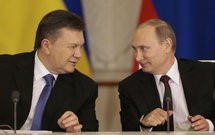 Russia and the West have been at loggerheads over the recent developments in Ukraine. Russian troops have seized Crimea -- a Ukrainian peninsula located on the northern coast of the Black Sea. Earlier, the upper house of the parliament in Russia approved deployment of troops in the Ukraine. The West has not taken very well the actions of Russia and has threatened it with economic sanctions and expulsion from the G8.
Russia and the West have been at loggerheads over the recent developments in Ukraine. Russian troops have seized Crimea -- a Ukrainian peninsula located on the northern coast of the Black Sea. Earlier, the upper house of the parliament in Russia approved deployment of troops in the Ukraine. The West has not taken very well the actions of Russia and has threatened it with economic sanctions and expulsion from the G8.
Kiev, having requested NATO to protect its territorial integrity and sovereignty, seeks security assistance from the US and the UK as per the Budapest Memorandum on Security Assurances. This treaty was signed in 1994 by the Russian Federation, the US and the UK affirming "their obligation to refrain from the threat or use of force against the territorial integrity or political independence of Ukraine".
Since November last year, Ukraine has witnessed waves of anti-government protests, marred by the loss of lives of many civilians and police personnel. The anti-government protests were sparked off after the former President of Ukraine, Viktor Yanukovych, decided not to sign the association agreement with European Union and instead opted to take an economic bailout package from Russia.
Yanukovych in a bid to calm the crisis signed a deal with the opposition countersigned by three EU foreign ministers to reduce his powers, form a new government and hold an early election. This was not signed by Russia. However, the deal was not acceptable to the protesters who wanted the ouster of the president. The parliament (Verkhovana Rada) dismissed Yanukovych after he fled the capital. Oleksandr Turchynov was appointed the interim president until elections are held on May 25.
However, as Konstantin Zatulin, the Director of the Institute of CIS Countries, recently said: "I can hardly imagine how, in such circumstances, the winner of an early presidential election will be recognised throughout the country. If he is a representative of the East, the West will not accept him, and vice versa."
The events in Crimea appear to support this view. Crimea does not recognize the legitimacy of the new power in Ukraine and in recent weeks has witnessed a surge of pro-Russian demonstrations. The Crimean Parliament has also voted to become part of the Russian Federation. Soviet leader Nikita Khrushchev had gifted Crimea to Ukraine in 1954. Its population comprises of ethnic Russian (58%), Ukrainian (24%), and Tatars (12%).
West and Russia have been accusing each other of interfering in Ukraine's domestic affairs. Both blame each other for causing the crisis and disagree on who is the legitimate authority in Ukraine. For the Western powers, it is the new interim government in Kiev, authorised by the Ukrainian parliament. Moscow has been questioning the legitimacy of Ukraine's interim leaders. Russia believes that a legally elected leader (Yanukovych) was removed in a coup d'etat and the current leadership in Kiev is in the hands of far-right extremists.
Russian officials have accused the Western authorities in Ukraine of exacerbating anti-Russian sentiment. Alexei Pushkov, head of the State Duma's International Affairs Committee, warned the opposition leaders in Ukraine not to "impose their views and approaches on all of the Ukraine, especially given that these approaches are often based on de-Russification and on openly anti-Russian moods". Russia's action in the Ukraine situation is demonstrative of the fact that it wants to protect its own interest and does not want Kiev to slip fully into the Western sphere.
Ukraine forms an important component of Putin's vision of Eurasian Economic Union -- a common trade and political block for Eurasia. Ukraine has a population of around 45 million, with a current GDP of US$ 176 billion. In 2012, 26 per cent (about $17.6 billion) of its exports went to Russia. Ukraine is also a key transit route for Russian energy supplies to Europe. For Western powers, the situation in Ukraine also holds military significance as it is taking place on Europe's and NATO's border.
The West as of now has not been able to develop a cohesive policy to deal with Moscow. The US had proposed economic sanctions, but many European powers are divided on this. This is partly because Russia is intertwined economically with Europe, which gets about 30% of its natural gas requirements from Russia.
Ukraine's heterogeneity creates a situation in which any attempt by the government to support a particular external actor leads to a sharp increase in internal tensions and in the long run may lead to division of the country.
What Ukraine really needs at this point is for both the West and Russia to work towards Ukraine's political and economic stability. The solution should see the territorial integrity of Ukraine being upheld and a common solution acceptable to all the sections of that country.
(The writer is an Associate Fellow at Observer Research Foundation, Delhi)
By Special Arrangement with : Observer Research Foundation (www.orfonline.org)